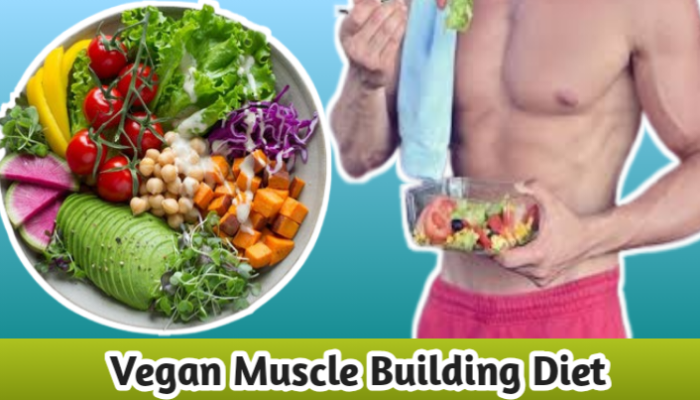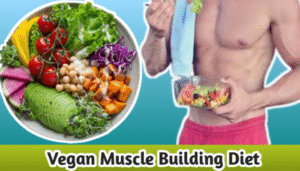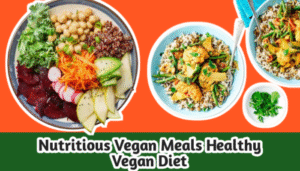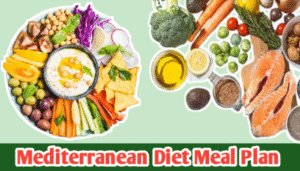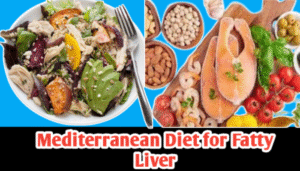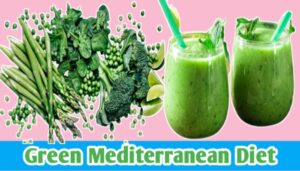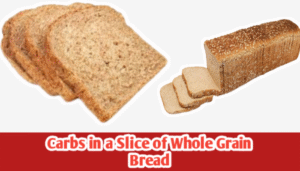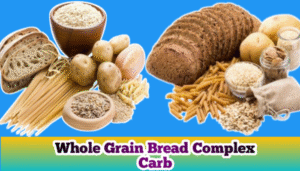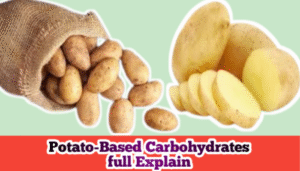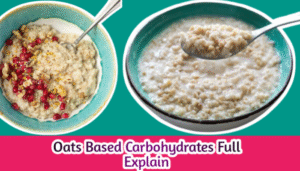Vegan Muscle Building Diet the popularity of veganism has gone beyond ethical and environmental reasons. Athletes, bodybuilders, and fitness enthusiasts are now embracing plant-based diets to achieve lean muscle growth without relying on animal products. The idea that muscle gain is only possible with meat, eggs, and dairy has been debunked by science and real-life examples of successful vegan athletes.
A vegan muscle-building diet focuses on plant-based protein sources, complex carbs, healthy fats, and micronutrients that fuel workouts, repair muscle tissues, and support long-term growth.
1. Why Choose a Vegan Diet for Muscle Growth?
- Ethical reasons: No harm to animals.
- Environmental benefits: Plant-based diets reduce carbon footprint.
- Health improvements: Lower cholesterol, better digestion, improved heart health.
- Inflammation reduction: Plant foods contain antioxidants that speed recovery.
- Proven success: Many athletes like Nimai Delgado, Patrik Baboumian, and Venus Williams thrive on vegan diets.
2. Myths About Vegan Diet and Muscle Building
- Myth: Vegans can’t get enough protein – Reality: Lentils, beans, tofu, tempeh, and seitan provide excellent protein.
- Myth: Vegan diets cause weakness – Reality: Balanced plant-based nutrition supports stamina and strength.
- Myth: Supplements are mandatory – Reality: Whole foods cover most needs; only a few (like B12) need supplementation.
- Myth: Vegan diets lack variety – Reality: From quinoa to almond butter, variety is greater than most omnivorous diets.
3. Macronutrient Essentials for Vegan Bodybuilders
Building muscle requires the right balance of macronutrients: protein, carbohydrates, and fats. Each plays a unique role in muscle repair, growth, and performance. Let’s break them down:
3.1 Protein – The Muscle Builder
- Role: Proteins are the building blocks of muscle tissue. After workouts, muscles undergo micro-tears, and protein helps repair and grow them stronger.
- Daily Requirement: For muscle growth, consume 1.6 – 2.2 g of protein per kg of body weight.
- Vegan Protein Sources:
- Lentils
- Chickpeas
- Black beans
- Tofu & Tempeh
- Seitan
- Edamame
- Quinoa
- Hemp seeds, Chia seeds, Flaxseeds
- Plant-based protein powders (pea, rice, hemp blend)
- Pro Tip: Combine legumes + grains (e.g., rice & beans) to form a complete amino acid profile.
3.2 Carbohydrates – The Energy Source
- Role: Carbs are stored as glycogen in muscles, providing fuel for workouts and recovery. Without sufficient carbs, the body breaks down protein for energy — slowing muscle growth.
- Daily Requirement: 3 – 6 g of carbs per kg of body weight depending on activity level.
- Vegan Carb Sources:
- Quinoa
- Brown rice
- Oats
- Sweet potatoes
- Whole wheat bread/pasta
- Fruits (bananas, berries, mango)
- Vegetables (broccoli, spinach, beets)
- Pro Tip: Prioritize complex carbs (slow digestion) for sustained energy and simple carbs (fruits, dates) around workouts for quick fuel.
3.3 Healthy Fats – The Hormone Regulators
- Role: Fats are crucial for hormone production, especially testosterone and growth hormone, which directly affect muscle growth.
- Daily Requirement: 20 – 30% of total calories should come from fats.
- Vegan Fat Sources:
- Avocados
- Nuts (almonds, walnuts, cashews)
- Nut butters (peanut, almond)
- Seeds (flax, chia, sunflower, hemp)
- Olive oil & Coconut oil
- Pro Tip: Include Omega-3 fatty acids (chia, flax, walnuts, algae oil) to reduce inflammation and support joint health.
4. Best Vegan Protein Sources for Muscle Gain
- Seitan (25g protein/100g)
- Tempeh (19g protein/100g)
- Lentils (9g protein/cup cooked)
- Quinoa (8g protein/cup cooked, complete protein)
- Hemp seeds (10g protein/3 tbsp)
- Plant-based protein powders (20–25g per scoop)
5. Top Plant-Based Carbohydrate Sources for Energy
- Oats, quinoa, sweet potatoes, brown rice
- Bananas and dates (pre-workout quick energy)
- Leafy greens for micronutrients + fiber
6. Essential Fats for Vegan Muscle Growth
- Flaxseeds, chia seeds, hemp seeds (Omega-3s)
- Almonds, cashews, peanuts (monounsaturated fats)
- Olive oil, avocado, coconut
7. Vitamins and Minerals Crucial for Vegan Athletes
Micronutrients are as important as macronutrients. Deficiency in vitamins or minerals can limit muscle growth, reduce energy, and slow recovery. Let’s break them down:
7.1 Vitamin B12
- Role: Helps in red blood cell formation, energy production, and nervous system function.
- Sources: Fortified plant-based milks, nutritional yeast, B12 supplements.
7.2 Iron
- Role: Essential for oxygen transport in the blood, boosting endurance and strength.
- Sources: Lentils, kidney beans, chickpeas, spinach, pumpkin seeds.
- Pro Tip: Pair iron-rich foods with Vitamin C sources (oranges, bell peppers) to improve absorption.
7.3 Calcium
- Role: Strengthens bones and supports muscle contractions.
- Sources: Fortified plant milks, kale, broccoli, sesame seeds, tahini.
7.4 Zinc
- Role: Supports immunity and aids in protein synthesis.
- Sources: Pumpkin seeds, cashews, lentils, quinoa.
7.5 Omega-3 Fatty Acids
- Role: Reduce inflammation, improve recovery, and enhance joint health.
- Sources: Chia seeds, flaxseeds, walnuts, algae oil.
8. Sample Vegan Muscle Building Meal Plan
Here’s a balanced daily meal plan tailored for muscle growth:
8.1 Breakfast
- Tofu Scramble with Spinach & Peppers
- 2 slices whole grain toast
- 1 glass fortified soy milk
- 1 tbsp peanut butter
8.2 Mid-Morning Snack
- Smoothie: Banana + Oats + Plant protein powder + Almond milk + Flaxseeds
8.3 Lunch
- Quinoa bowl with:
- Lentils
- Roasted sweet potatoes
- Steamed broccoli
- Avocado slices
- Olive oil drizzle
8.4 Pre-Workout Snack
- Dates or banana with almond butter
- Handful of walnuts
8.5 Dinner (Post-Workout)
- Grilled tempeh with brown rice
- Roasted vegetables (zucchini, carrots, beans)
- Side salad with chickpeas & tahini dressing
8.6 Post-Workout Shake
- Plant protein powder + Almond milk
- 1 tbsp chia seeds
- Handful of frozen berries
9. Vegan Supplements for Muscle Growth
- B12 (essential)
- Vitamin D (if low sun exposure)
- Creatine Monohydrate (vegan-friendly, improves strength)
- Protein powders (pea, rice, hemp blend)
- Omega-3 (algae oil)
10. Workout and Diet Balance: The Key to Vegan Gains
No diet alone builds muscle — it must be paired with progressive resistance training. Focus on:
- Compound lifts (squats, deadlifts, bench press)
- Proper recovery (7–8 hrs sleep)
- Tracking macros consistently
11. Tips for Transitioning to a Vegan Muscle-Building Diet
- Start with Meatless Mondays, then gradually expand.
- Experiment with plant-based recipes.
- Track protein intake daily.
- Join vegan fitness communities for support.
12. Common Mistakes to Avoid
- Relying too much on processed vegan junk food.
- Neglecting protein variety.
- Forgetting supplements like B12.
- Not eating enough calories for bulking.
13. Success Stories of Vegan Athletes and Bodybuilders
- Patrik Baboumian – Strongman, famous for carrying a 555kg yoke.
- Nimai Delgado – IFBB Pro bodybuilder, lifelong vegetarian turned vegan.
- Venus Williams – Tennis champion thriving on raw vegan diet.
14. Conclusion
A vegan muscle-building diet is not only possible but highly effective when planned well. By focusing on macronutrients (protein, carbs, fats), micronutrients (B12, iron, calcium, zinc, omega-3s), and a structured meal plan, you can build strength, endurance, and muscle mass while staying true to plant-based living.
